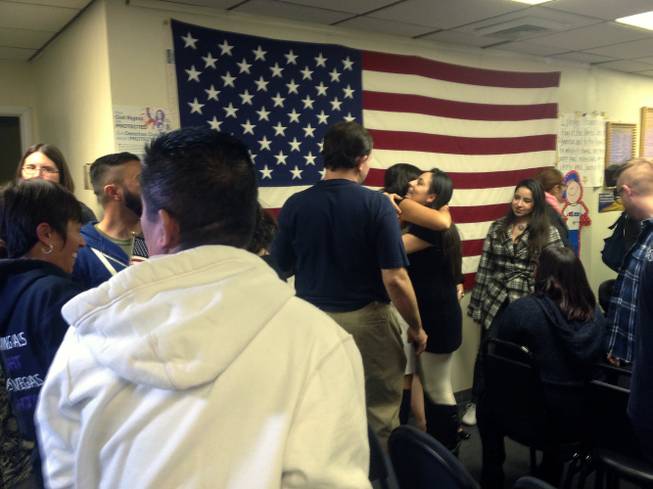
Activists at a Las Vegas community center watch party embrace as they celebrate the news of President Barack Obama’s immigration announcement, Thursday, Nov. 20, 2014.
Friday, Nov. 21, 2014 | 2 a.m.
Related news
- 3 takeaways from Obama’s immigration announcement
- Las Vegas activist Astrid Silva returns to spotlight in Obama’s immigration speech
- Nevada leaders weigh in on Obama’s immigration plan
- Why Obama’s speech may be unofficial launch of Reid’s re-election campaign
- Nevada’s Hispanic voters stayed home, drifted away from Democrats
President Barack Obama’s plan to reform the country’s immigration system promises to protect millions of people living in the country illegally.
That could have a big impact on Nevada, which has the biggest population share of undocumented immigrants in the country, according to Pew statistics. Those 210,000 residents make up about 10 percent of the labor force, higher than any other state.
Jubilant crowds of activists celebrated the president’s executive action at a Las Vegas community center Thursday evening, calling it a victory for people living in the shadows.
“It’s so exciting,” said Maria Guadalupe Arreola, an undocumented immigrant who moved to Las Vegas more than two decades ago from Jalisco. “This is an important battle. But we have yet to win the war.”
Here’s what the measure means for the Silver State:
It may not only quell fears for those who fall under the new plan, but also people who were eligible for relief before.
Obama’s plan greatly benefits undocumented parents. Immigrants who have been in the U.S. illegally for more than five years but whose children are citizens or residents can apply to stay without fear of deportation for three years.
The executive action also expands the Deferred Action for Childhood Arrivals program to include more immigrants who came to the U.S. as children.
The Migration Policy Institute estimates that 25,000 people in Nevada are potentially eligible for DACA, but less than half that many have applied.
Experts say people may not be applying because they’re confused about their eligibility, they may not be able to afford the required $500 fee, or they might just be apprehensive about stepping out of the shadows.
Even DACA recipients live in fear for relatives who are in the country illegally. According to a nationwide survey conducted by Harvard University and the University of Southern California, 14 percent of recipients said they had a parent or sibling who had been deported.
“Some people are concerned the people they want to get help won’t be included,” said Andres Ramirez, president of the Ramirez Group, a Las Vegas-based political consulting firm that frequently works with Democrats. “But more people are being included now, and that’s always a positive side.”
It could bring some relief to the courts.
The Justice Department is issuing a package of court reforms to streamline the backlogged immigration court process.
This is meant to close deportation cases for people who are considered low-priority. Obama said Thursday night he wants to deport “criminals, not children.”
Among thousands of immigration cases closed each year in Las Vegas, only 3 percent are dismissed at the discretion of federal prosecutors, according to the Transactional Records Access Clearinghouse at Syracuse University. The national average is 7 percent.
It could help diminish labor trafficking.
Under Obama’s plan, the Labor Department is expanding immigration options for victims of crimes and trafficking who cooperate in government investigations.
“Labor trafficking doesn’t get as much attention as sex trafficking, but it’s much more prevalent,” said UNLV law professor Fatma Marouf. “A lot of manual labor, especially, is where you find people being exploited by their employers.”

Join the Discussion:
Check this out for a full explanation of our conversion to the LiveFyre commenting system and instructions on how to sign up for an account.
Full comments policy